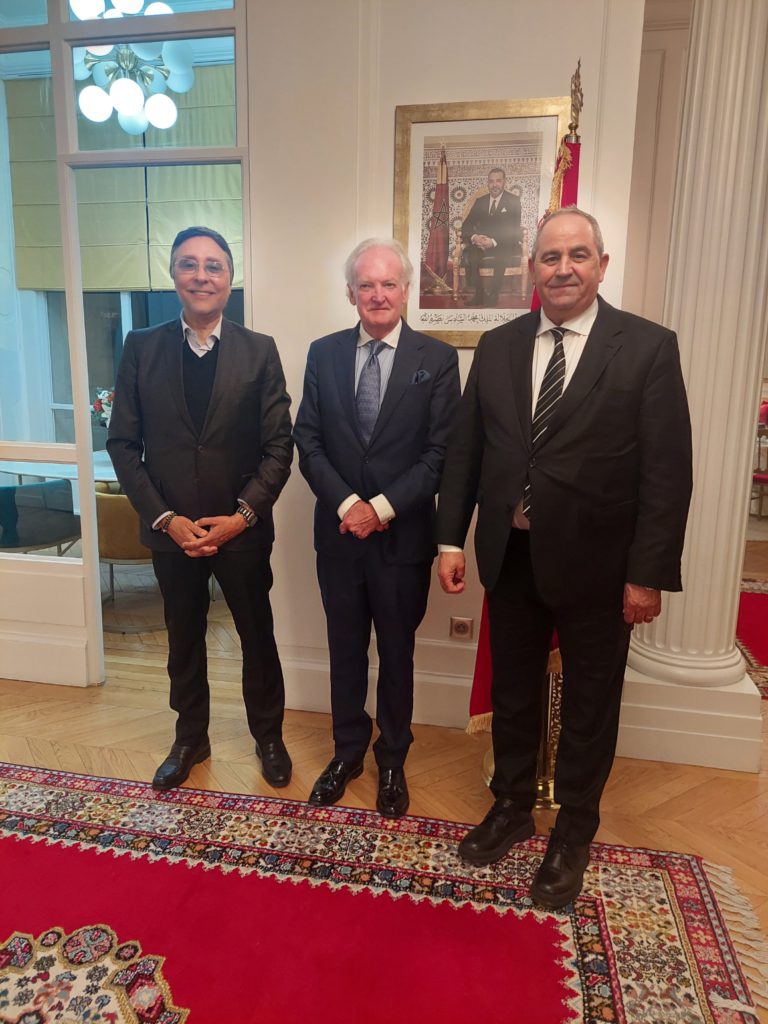St. Kitts and Nevis Pursues Partnerships in Applied-Science at UNESCO conference
(UNESCO National Commission) –St. Kitts and Nevis was among the Small Island States this week exercising leadership and speaking up about the need for trusting partnerships between Science and technology-endowed states and the thirty-eight small islands world-wide which are sorely in need of investments in more innovative, cutting-edge technologies as well as scientific information-sharing. Small Island Developing States comprise twenty per cent of the membership of the United Nations.
The Federation’s Ambassador to UNESCO in Paris, H.E. David P. Doyle, was one of the few SIDS Ambassadors attending the UNESCO Global Ministerial Dialogue on Science Diplomacy Conference held in Paris from 25 to 26 March 2025. The conference was attended by 22 ministers and 30 plus ambassadors, together with representatives from the OECD, the European Commission, the International Science Council and the African Commission for Education, Science, Technology and Innovation.
This was the first UNESCO conference held on the topic aimed at galvanizing science diplomacy in the interests of shared natural and scientific resources across the globe.

Ambassador Doyle spoke of cross-frontier scientific research and innovation collaboration in the context of small island developing states, like St. Kitts and Nevis, who share a number of challenges with gaining a foothold in bilateral and multilateral scientific breakthroughs.
“The challenges of Small Island Developing States (SIDS) are highly associated with extreme vulnerability to external shocks, as well as those vulnerabilities arising from SIDS’ structural characteristics of low economies of scale, remoteness, and environmental risks”. He stressed that these combined impediments prevented small islands from securing external financing, “but also accessing cutting edge scientific innovations. The climate change challenges and the recent COVID 19 pandemic have exacerbated SIDS’ economic and social vulnerabilities”.
In the world of science, technology and innovation, “SIDS face low levels of investment in research and development, inadequate access to financing, underdeveloped STI infrastructure, lack of high-quality disaggregated data and limited budgetary resources for science education”.
The St. Kitts and Nevis Envoy went on to highlight the importance of science diplomacy in promoting dialogue, fostering trust, and strengthening international collaboration, technical and scientific information-sharing and best practice.
UNESCO has embarked on a new initiative to promote the universal language of science, collaboration and science diplomacy as a key catalyst in accelerating sustainable development, advancing human rights, and fostering peace, a point that was reiterated by many ministers and ambassadors at the UNESCO conference. Ambassador Doyle represented the Hon. Deputy Prime Minister with responsibility for UNESCO affairs, Dr. Geoffrey Hanley, at the UNESCO conference, who fully endorsed the need for deploying the use of shared best-practice in science, technology, innovation and digitalization to drive economic growth and sustainable development.
Minister Hanley commented: “Our small island vulnerabilities could be comprehensively addressed, faster and more productively, in my view, if we accelerate action towards sharing best practices, transferring technologies and scientific innovations on a North-South basis. It is also important to find avenues for South-South and triangular cooperation, where trusting partnerships across the global South and North can be leveraged for the transfer of knowledge, technology, skills, expertise and resources to achieve the Sustainable Development Goals Agenda 2030.”
Ambassador Doyle urged UNESCO and Member States with extensive science and technology expertise to assist SIDS in identifying the critical scientific gaps faced by small islands, limited by resources and deploying small pools of scientific talent.
He underscored that small islands can also play a role in boosting indigenous science innovation, with the assistance of experts from UNESCO and larger science-endowed states through the avenue of triangular South-North cooperation:
“Examples of SIDS home-grown innovation — grown out of necessity, harnessed over generations, and rooted in local and indigenous knowledge — were cited. In Vanuatu, for example, the Secretariat of the Pacific Regional Environment Programme links local and traditional knowledge with technology, inviting communities to track indicator species on their smart phones and monitor climate change and biodiversity loss. In St. Kitts and Nevis, our Man and the Biosphere reserve has become the testing zone for cultivating new fruits and vegetables and medicinal plants, which are resistant to heat and drought.”
“International partners can support us by capitalizing on these strengths by assisting us in addressing the substantial structural challenges we face in building the necessary ecosystem, institutional capacity for developing and using science, technology, innovation and digitalization to drive economic growth and sustainable development.”
The St. Kitts and Nevis intervention concluded with a plea for triangular South-South cooperation, under the auspices of UNESCO, to enhance support, investment and partnerships for developing resilient energy transitions and energy efficiency, embracing clean and renewable energy infrastructure, scientific technology and training, with a view to fulfilling SIDS’ ambitious renewable energy ambitions
Backed by a number of Member States, note was taken of the Federation’s suggestion that cost-effective emerging ICT tools, such as AI, could facilitate assistance to SIDS in developing national roadmaps for digitalization, science, technology and innovation (STI) and to support SIDS to build up national capacities for developing and utilizing the state-of-the-art technologies, including renewable energy technologies, marine technologies for the ocean-based economy and other areas significant to sustainable development, including digital technologies
Commenting on St. Kitts and Nevis’ participation at the UNESCO Global Ministerial Dialogue on Science Diplomacy Conference, H.E. Nerys Dockery, Secretary-General of the SKN National Commission for UNESCO, stated: “The Government of St. Kitts and Nevis believes that wide-ranging scientific discoveries, wherever they originate, can be made sharable through mutually-beneficial partnerships and diplomatic relations and engagement, and, once deployed and adjusted to small island states’ conditions, can become the motors for innovation and economic growth at local level.”
END

